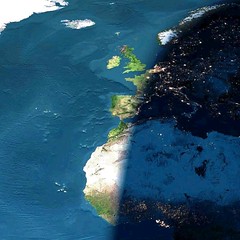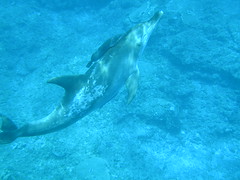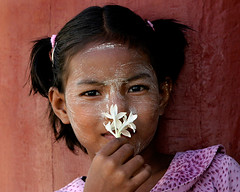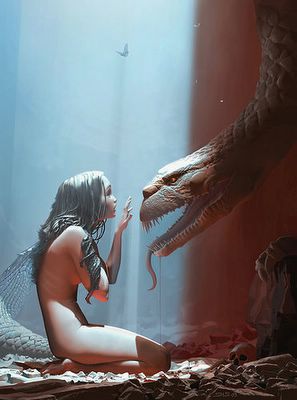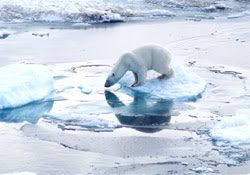Dolphins seldom display aggression towards humans, even in captivity.
These toothy imps of the deep are also extremely sensitive creatures, or so it would seem. There are certainly many stories of dolphins sensing pregnancy, menstruation, cancer, and mental illness in people. Even more astounding are reports of dolphins rescuing drowning men and women.
Horace Dobbs in his book, Tale of Two Dolphins, relates the story of a woman who screeched in fear at the sight of Percy, a wild bottlenose dolphin, approaching her in the water. The dolphin swam up to her, prodded her in the belly, pushed her head under the water, and swam off.
Meanwhile back at the boat, Tricia Kirkman, a poor swimmer, finally plucked up the courage to enter the water. She did so gently. Percy approached her, turned over onto his back, and allowed her to hold onto his fins as he sailed through the water. Dolphins seem to have a remarkable ability to sense the inner world of the human being.
By dunking the first woman’s head under the water was Percy treating her in just the right way to wake her from her fearful silliness? I don’t know. I can tell you that I was once tickled in the stomach and had my head dunked under water at the same time and I was far more relaxed when I surfaced.
What about whales and dolphins in captivity? We do not yet know how being confined in small spaces affects these mammals. We do not understand what biological and psychological changes are occurring within their great bodies. We have no comprehension of their feelings and no emotional identification with them either, it would seem
Orca, the “killer” whale is typically friendly towards humans from his cement pool. The makers of “Free Willy” would not have earned their millions without this astounding attitude of tolerance. We live in a world where filmmakers benefit from animal actors kept in captivity. These mammals portray on screen the ultimate freedoms that they will most likely never experience.
I know that if anybody kept me in a tank for decades I would be, shall we say…a touch cranky. Orcas are more than capable of killing a human being and they do have a taste for mammal protein. Dolphins in the wild attack sharks by knocking them with their hard beaks and could easily do the same to you and me. Have you noticed that they don’t?
There are other interesting things to learn…
Millions of people watched Free Willy. Let’s look at a mere thousand of them. Around 170 to 200 of every thousand people who watched Willy take to the waters of freedom will die of cancer. Few mammals on earth can say that this mutation of cellular material does not have the power to threaten their remaining days. Dogs, cats, mice, and cows are all prone to cancerous infiltrations.
Blue whales, however, are not.
Between 1909 and 1935 countless blue whales were killed and examined. Not one of them was found to have cancer of any kind. Why? How had Leviathan escaped a disease humans had been fighting for decades? An endocrine adaptation? Nobody knows. Japanese and Soviet whaling vessels almost wiped the species out in those dark days.
I do wonder though. What explains this lack of aggression in the cetacean, their seemingly optimistic outlook in what must surely be a miserable situation? Why does cancer not touch these lords of the deep? Why do they seem relentlessly friendly in the face of such torture?
We know that whales and dolphins are among the most intelligent creatures on earth (look into their eyes if you get the chance). Surely an intelligent animal would not submit to a life in an alien world, a world so far removed from the vastness of the oceans as to be another planet? After all even monkeys object to a life behind bars, an animal arguably less intelligent than a cetacean.
Could it be because they have no choice but to submit to alien hands? I doubt it. An orca could kill a person without even batting an eye. The consequences of such an action could only lead to further contemplation on my part. But why not simply avenge the loss of their freedom? It would after all, only take a split second decision. And yes they do know they’re not in the ocean anymore.
Personally, I vote for this explanation:
Whales play for three times
As long as they spend searching
For food
Delicate, involved games,
With floating seabird’s feathers,
Blown high into the air,
And logs of wood
Flipped from the tops
Of their heads;
Carried in their teeth
For a game of tag
Ranging across
The entire Pacific
Play without goals
Heathcote Williams
Even in captivity whales and dolphins play. Has the remarkable ability to engage in fun and games made these animals masters not only of the deep but of cooperation and tolerance too? Enabled them to ward off the horror of cell destruction? Helped them to regard humans with an indulgence they do not deserve?
In that case…we should play more.





